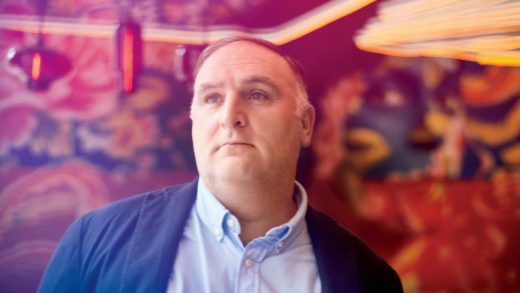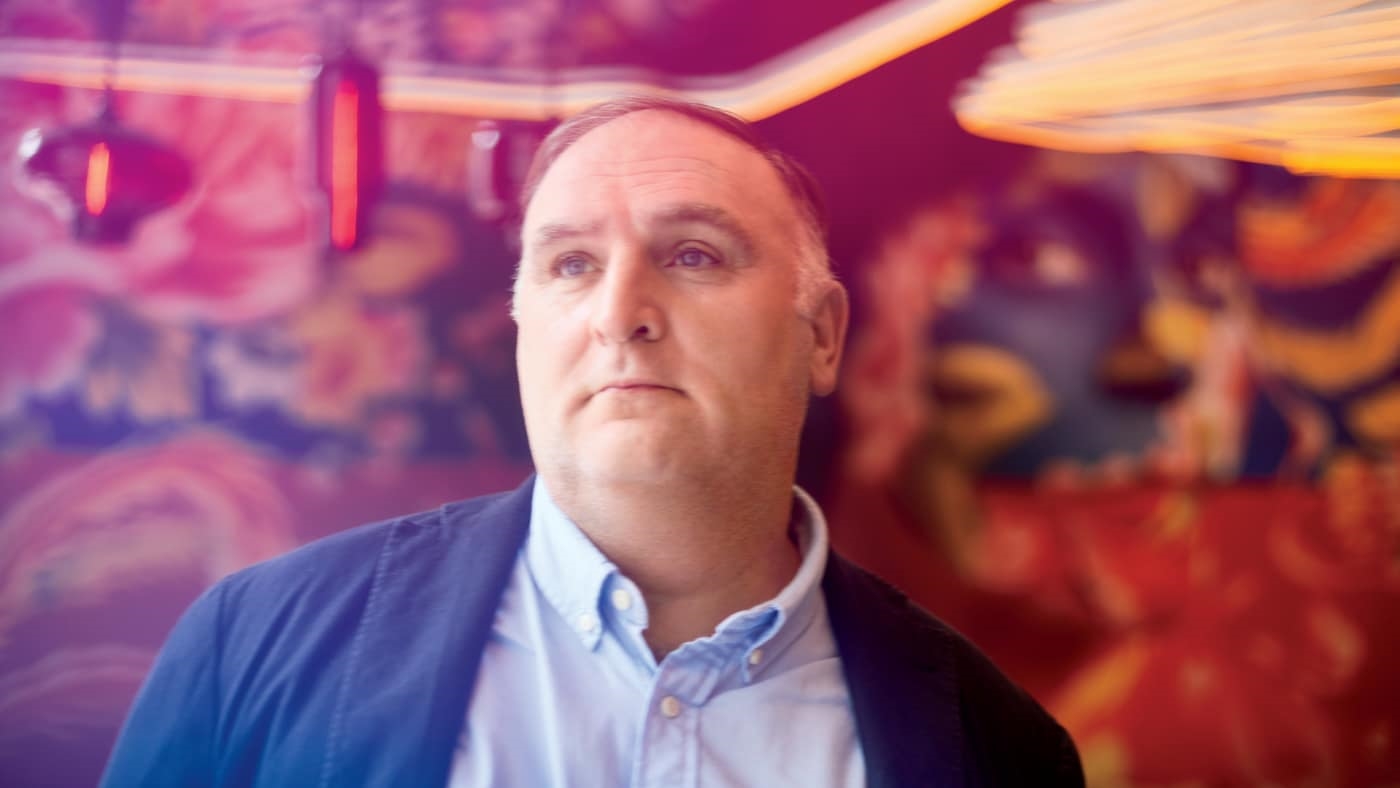How Chef José Andrés Turns Impulsiveness Into An Asset
Most days, the restaurateur and chef José Andrés rises around 7 a.m. and, after flicking through the headlines on his iPhone X, makes his way over to his home gym to work the elliptical machine. Only after he’s showered and shaved does the 48-year-old, who likes to describe his career as “one long attempt to explain the world through food,” allow himself his first meal of the day: a glass of fresh-squeezed fruit juice and a large mug of coffee with steamed milk, typically consumed in the kitchen of the Maryland home he shares with his wife, Patricia, and their three daughters.
“My wife is always telling me, ‘Enjoy the moment. The moment is now,’” Andrés says one recent morning, sipping the foam from the coffee. He is dressed, as he usually is, in rumpled khakis and a dress shirt. His feet are bare; his hair, still damp, protrudes at strange angles from his head. “Sometimes I get close,” he sighs. “But pretty soon I’m thinking, Maybe you’d be happier if you were there, doing that. Then I’m off again.”
The past year has been an especially peripatetic one for the chef, both logistically and professionally. Holding out one hand, he ticks down the list on his fingers: First, there was the legal battle with the president of the United States–an imbroglio that originated in 2015, when then-candidate Donald J. Trump described Mexicans as “rapists” and criminals. Andrés, who was born in Spain and became a naturalized American citizen in 2013, promptly pulled out of a deal to open a restaurant in the lobby of the Trump hotel in D.C. Trump sued Andrés for $10 million for breach of contract; Andrés countersued for the $8 million he said he had already invested in the property, arguing that “the perception that Mr. Trump’s statements were anti-Hispanic made it very difficult to recruit appropriate staff for a Hispanic restaurant, to attract the requisite number of Hispanic food patrons for a profitable enterprise, and to raise capital for what was now an extraordinarily risky Spanish restaurant.”
Last spring, Trump and Andrés settled the lawsuit, but the bad blood between the two men persists, and in recent months Andrés has only stepped up his criticism of the president’s immigration policies–especially the decision, earlier this year, to revoke the temporary protective status granted in 2001 to hundreds of thousands of Salvadoreans. As Andrés points out to me, it was not that he didn’t support the idea of immigration reform. But many Salvadoreans work in the restaurant industry, and he worried about the hole their sudden exit would leave in the economy–not to mention, of course, his own business. The revocation order, he says, “wasn’t pragmatic, it wasn’t thought out. It just made for chaos.”
Then there were the emergency humanitarian aid trips–taken on behalf of Andrés’s charity, World Central Kitchen. Andrés traveled to storm-ravaged Houston in August to cook for survivors. He went to Puerto Rico a little over a month later to provide food and assistance as the island struggled to recover from Hurricane Maria. And he ventured to Southern California just a few months after that, joining food-world friends such as Tom Colicchio to whip up meals for residents displaced by wildfires. (Andrés received the James Beard Foundation’s 2018 Humanitarian of the Year award in February and was honored for his efforts onstage at the Academy Awards in March. Five days later, he announced that one of his D.C. restaurants would provide free sandwiches and drinks for students participating in the March for Our Lives rally.)
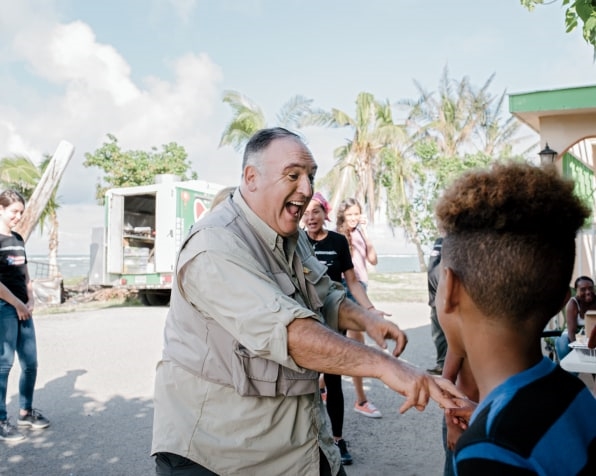
Finally, there have been the demands of his increasingly tentacular restaurant empire, ThinkFoodGroup, which has grown out of Andrés’s first American property, the 25-year-old Jaleo, near the National Mall in Washington. The business now includes 29 properties in eight cities in the United States, Puerto Rico, and Mexico–from the double-Michelin-starred Minibar, in Washington, D.C., to the sultry Spanish-inspired Bazaar, in Miami, to Mi Casa, in the Puerto Rican resort town of Dorado. Last April, ThinkFoodGroup forged an exclusive partnership with food-service management giant Compass Group to develop new concepts and expand on existing ones, including Beefsteak, Andrés’s three-year-old plant-centric restaurant chain. It’s also creating an Eataly-style food hall in New York’s Hudson Yards development.
Andrés clearly relishes the frenetic pace, but he admits it has taken a toll: While working in Puerto Rico last fall, he lost 20 pounds and was sick for days at a stretch. He says he is struggling to reckon with his newfound status as a political figure, a role he tells me he never sought out and does not particularly want. “Politics is a kind of game,” he says, “where you’re exchanging this for that.” Andrés isn’t interested in negotiating. He just wants to help the people who need it. Not that he has the diplomacy for politics, anyway: When the chef was refused entrance to an after-party following the annual Alfalfa Club dinner in D.C. in January–a glamorous affair that drew George W. Bush, Madeleine Albright, U.S. Supreme Court Justice John Roberts, and others–he jumped to conclusions. He tweeted out a photo of himself at the door, surmising that Ivanka Trump was to blame, and tagged The Washington Post. It was retweeted 13,000 times. The next afternoon, he tweeted again: Ivanka had reached out to him. She’d had nothing to do with it. Along with his apology, he included a plea for immigration reform that would protect Dreamers.
In many ways, Andrés resembles fellow business luminaries such as Chobani’s Hamdi Ulukaya, Starbucks’s Howard Schultz, and Patagonia’s Rose Marcario, who have managed to expand their enterprises while speaking out about–and acting on–their values. But Andrés’s spontaneity makes him unique. Through his prolific use of social media, his lack of filter, and his impulse to go where the action is, Andrés is pioneering a rapid-response model of leadership. This is no fully vetted corporate social responsibility effort. It’s one man acting on instinct, adjusting on the fly, and observing as things tend to fall into place behind him. This freewheeling approach might rankle some, but it’s working: He’s attracting talent to ThinkFoodGroup, donations to World Central Kitchen, and customers to his restaurants. He is a walking, tweeting, pot-stirring, brand-building experiment.
Kimberly Grant, formerly the COO and president of Ruby Tuesday who was hired in 2014 to be ThinkFoodGroup’s CEO, recalls accompanying Andrés to a charity dinner in Miami last year that was “black tie, very formal, full of celebrities,” she says. “José gets up there to give a speech, and at the end, he rips open his shirt, and he’s got a T-shirt underneath.” Four words were emblazoned on the front: I AM AN IMMIGRANT. “None of us had any clue he was going to do that,” Grant says. “But that’s José.”
Andrés’s transformation from chef to activist began in 2010, with a phone call. Manolo Vílchez, the Spanish head of a solar-powered-stove company, alSol, was headed down to Haiti to distribute cooking equipment to survivors of the recent earthquake. Did Andrés want to come along?
As a 19-year-old chef in the Spanish Navy, Andrés had traveled to the Ivory Coast and the favelas of Brazil and encountered, for the first time, desperate levels of poverty. “In Spain, there are people who go hungry, obviously,” Andrés recalls. “But I’d never seen hunger like I did in those places.” It stuck with him, and when he arrived in the U.S., as a young chef, he started volunteering with local soup kitchens; later he joined an organization called Share Our Strength and helped teach cooking classes in disadvantaged communities around D.C. He often grew frustrated, he says, “because I couldn’t see immediate results.”
Vílchez was offering him a chance at instant feedback, and after hanging up the phone, Andrés threw his things into a couple of old backpacks and headed to the airport. “I didn’t take that much,” he says. “Some money, a knife, a fishing vest”–the same tan Orvis vest, now sweat stained and sun faded, that he sports in numerous recent photographs from Puerto Rico. When he arrived in Haiti, he says, “it was chaos.” Hundreds of thousands were dead; more than a million were displaced. For almost two weeks, Andrés and his companions trekked across the country, sometimes sleeping in the homes of locals or under the stars. The alSol team set up more than a dozen solar cooking facilities around the island, and Andrés taught residents how to use them.
Andrés returned from the trip invigorated, and over coffee with Robert Egger, the head of DC Central Kitchen, a charity that distributes unused food from local restaurants to the city’s homeless population, he made a proposal: Why not create an international version of the group? It could be called World Central Kitchen. Egger, who worked alongside Andrés for years at DC Central Kitchen, where Andrés had been a volunteer since the early 1990’s–and later a major fundraiser–agreed. “José,” he says, “has a record of pulling stuff out of his ass and making it work.”
Initially, World Central Kitchen had two full-time employees (both have since left), and the organization’s attention was focused on Haiti, where it established a sanitation training program for local cooks and built a bakery, still active today, that helps feed the residents of an orphanage in the town of Croix-des-Bouquets. “My feeling was that a lot of NGOs were doing important work in Haiti, but in the long term, the problems weren’t getting fixed,” Andrés says. “Or the problems were getting bigger.” He was looking to implement projects like the bakery, that would become part of the fabric of the community, that wouldn’t just feed people, but would also train locals in a profession.
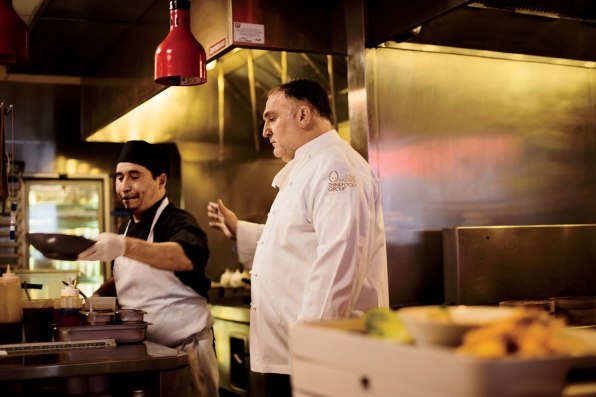
Soon, Andrés was raising hundreds of thousands of dollars for WCK from large donors such as the Crown family. The organization partnered with 11 restaurants, including a handful in the ThinkFoodGroup portfolio, for a World Food Day fundraiser in 2014, with 10% of all earnings going to WCK. In Zambia, it opened a bakery modeled after the one in Haiti. In the Dominican Republic, it invested in a beekeeping company run entirely by women. In Nicaragua, it joined forces with a Central American NGO to help members of a coffee-roasting collective sell their beans directly to major American markets. All of these projects remain operational today.
Back in the States, Andrés helped Egger open L.A. Kitchen, a sister institution to the one in D.C., and presided over the creation of the Chef Network–a small army of what is today around 100 food industry pros, including Anthony Bourdain and Andrew Zimmern, who contribute to WCK in various ways, including outreach trips around the globe. As these culinary and philanthropic efforts grew, the awards piled up: Andrés received an honorary doctorate from George Washington University and a National Humanities Medal from President Barack Obama.
By early last year, the accolades–and his ongoing dispute with the Trump family–had made Andrés one of the most famous chefs in the country. But it was his work after Hurricane Maria that made him a household name. As Andrés tells it, he had no concrete plans when he and filmmaker Nate Mook, who had volunteered on numerous WCK initiatives, boarded a plane to Puerto Rico in September, mere days after the category 5 storm swept across the island, killing dozens and leveling the power grid. “I just knew I needed to be there,” Andrés says.
It became immediately clear to them “that no one there was really dealing with the hunger situation,” Mook says. “There was food, but no one was equipped to prepare it. So José made some calls, and we ended up in this beachside kitchen [of a restaurant] run by José Enrique”–the best-known chef in Puerto Rico. “There were holes in the roof, and all this water was coming in, but there was a generator. And we started cooking.”
Eventually, they established 23 kitchens that churned out what Andrés estimates to be more than 3.3 million meals, leaning on local volunteers for help with cooking and distribution. On Andrés’s insistence, many of the meals were hot–big, steaming pots of paella and chicken and rice. “It worries me that the only thing someone should get right after a disaster is some kind of military-style NutraPack or whatever they’re called,” says Andrés. “People need real food. They need the comfort of it.”
Andrés ended up spending more than 10 weeks on the island, spread over multiple trips. He found the work rewarding yet aggravating, due to the way he saw the Trump administration mishandling the relief situation. As with all things Trump, Andrés didn’t bother keeping his opinions to himself. “The most inefficient place on earth,” he wrote in one Twitter post last fall, under a photograph of the Federal Emergency Management Agency headquarters in Puerto Rico. A top official at FEMA, which had funded some of the World Central Kitchen’s programs there, responded by writing off Andrés as a “colorful…businessman looking for stuff to promote his business.”
There’s no question that the relief work has helped increase Andrés’s visibility. Hundreds of articles have been written about the chef’s efforts in Puerto Rico alone, and he has become a frequent source for journalists looking into government aid efforts on the island. But, he says, none of this is commercially motivated, any more than his volunteer work in the soup kitchens in New York and D.C. was. “Sometimes,” he says, “you have to hold your ground. You have to speak from the heart.” He is the head of the largest restaurant empire in the capital city of the United States. More than half a million people follow him on Twitter. He has a soapbox, and he intends to use it.
On paper, World Central Kitchen and ThinkFoodGroup remain wholly separate entities. In practice, the distinction is blurry: Each effort informs the other. Andrés’s commercial success and rising profile make it easier for World Central Kitchen to attract top restaurant talent to its Chef Network; WCK’s philanthropy, in turn, has a halo effect on ThinkFoodGroup–and motivates its more than 1,200 employees. “I came to ThinkFoodGroup in large part because of the outreach work José was doing,” says Eric Martino, COO of the company’s fast-casual division. “It makes you go, ‘I’ve got to find a way to match that.’” In February, Martino orchestrated a collaboration with DC Central Kitchen so that graduates of its job training program receive placement at a local Beefsteak outpost. “As an organization, as you expand, you want to have that,” he says. “You want a reminder from the top that this is more than about serving food.”
Since the beginning, Andrés’s restaurant empire has been in a more or less constant state of expansion, both in terms of scope and geographic reach. Initially, the chef stuck primarily to the Spanish cuisine he’d mastered during his time as a young chef at El Bulli, the Catalonian restaurant considered the pinnacle of molecular gastronomy until it closed in 2011. Jaleo, on the Mall in D.C., is credited for popularizing Spanish tapas in the U.S. But the critical and popular success of the place also gave Andrés the confidence to experiment with a more diverse menu, often at considerable professional risk. Minibar, an expensive D.C. restaurant known for cutting-edge culinary techniques (e.g., mojitos as squares meant to be chewed, not drinks to be sipped), could have been a costly, pretentious flop when it opened in 2003. Instead, the establishment earned two Michelin stars. Similarly innovative efforts, like the Asian-Peruvian fusion joint China Chilcano, which launched in D.C. in 2015, and the seafood-centric Bazaar Mar, which opened in Miami a year later, have helped ratchet ThinkFoodGroup’s revenue to, as of last year, well over $150 million.
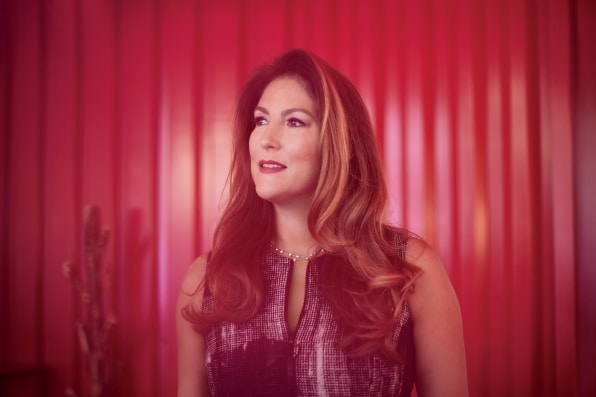
Today, Andrés is not as intimately involved with every new restaurant opening as he once was. More and more, he serves as final arbiter–of menu choices, of restaurant design–with CEO Kimberly Grant and others attending to everyday development details. There are plenty to go around. In addition to opening new Beefsteak locations this fall–including one at the Cleveland Clinic, in Ohio–ThinkFoodGroup will debut a massive Spanish-inspired food hall in the new Hudson Yards, in the shadow of Manhattan’s High Line, in partnership with fellow El Bulli veterans Ferran and Albert Adrià. In December, the company announced that it would provide food and beverage services for the Esports Arena in the Luxor hotel, in Las Vegas.
Meanwhile, in Texas in February, Andrés opened a new location of Zaytinya, his Mediterranean-inspired offering. Eventually this Zaytinya outpost will be one of several ThinkFoodGroup establishments in the Dallas area–an approach the company has used effectively in L.A. and D.C. “Think about it in terms of efficiency,” CEO Grant says. “Could Zaytinya be [our] only Dallas restaurant? Yes, but if you have a cluster of restaurants, you’re able to share the burden of food procurement, you’re able to share staff–you can have one sommelier who moves between the locations.”
When I visit the restaurant, which is located in the wealthy northern Dallas suburb of Frisco, the mood on a cloudy winter day is one of upbeat disorder. The open-air kitchen is raucous and busy; the recently hired waitstaff darts from table to table, catering to friends and family who have been pressed into service as testers. “It’s crazy, but all restaurant openings are, because nothing is ever ready exactly when you need it to be,” says Joe Raffa, ThinkFoodGroup’s D.C.-based executive chef. Still, he has grown accustomed to the process. “If you can deal with the occasional gray hair, there’s a lot of joy to it, and a lot of creativity. Nothing is ever a cookie-cutter replication, even if we’re working with an existing brand. You bring in new menu items: We’re going to do a lot more beef here, because it’s Texas. You create a unique vibe.”
Like most new ThinkFoodGroup properties, the Frisco Zaytinya had been developed over the course of more than a year, starting with a series of scouting trips. Once a general area is identified, the discussion turns to the type of restaurant that will best fit the neighborhood. In the case of Frisco, ThinkFoodGroup had been approached by backers who knew specifically that they wanted a Zaytinya, but Grant told me she would have proposed something similar, regardless. “We could have done Bazaar Meat”–the company’s steak-centric chain–“but that wouldn’t have differentiated us enough in this market. Ditto for Oyamel,” ThinkFoodGroup’s Mexican brand.
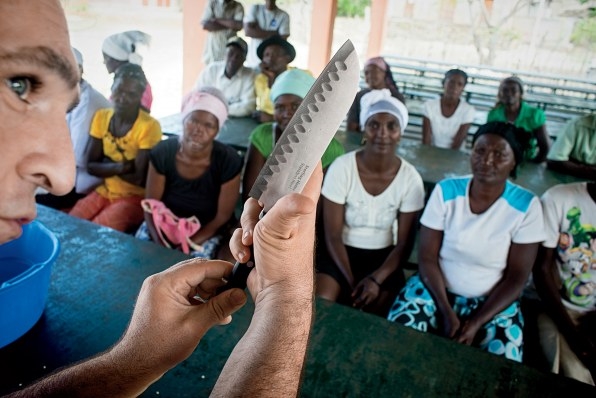
After a lease is signed, design and construction begin, with Andrés regularly cycling through to offer suggestions and feedback. When launching Bazaar Meat, in 2014, “we knew we were going to do a meat restaurant, and we all sat down together to discuss concepts,” Raffa remembers. “We had some stuff to show him. Some he liked, and some he didn’t. Then we came back to his office, and every wall was literally covered in printouts of pictures and menu items. He was exploding ideas. And it was so specific: It was, ‘Get me this steak I ate 12 years ago at this small restaurant in Spain.’”
At Zaytinya in Frisco, the lunch service winds down and the staff settles in for a communal meal before another wave of friends and family show up for dinner. Grant retreats to a corner with Michael Doneff, ThinkFoodGroup’s CMO, to discuss plans for additional restaurants for the Dallas cluster. They’d recently spotted a storefront they liked in the rapidly ballooning uptown area.
“It’s just a question of when the landlord can deliver it,” Doneff says.
“Right,” Grant agrees. “But we’ll get there.”
A few weeks later, they do. And the cycle starts again.
More than two decades after the opening of the first Jaleo, in D.C., the surrounding area has been so densely colonized by ThinkFoodGroup that you can hardly walk a block without passing a property operated by the company: Oyamel and China Chilcano on Seventh Street; Zaytinya, Minibar, and the experimental cocktail space Barmini on Ninth; the corporate headquarters on D Street.
One overcast afternoon, I trail Andrés as he ping-pongs from one restaurant to the next, his thick arms pumping, his Camper sneakers unlaced. At Oyamel, he chuffs down some guacamole. At Jaleo, he wonders aloud why the back door is ajar–“Needed some air,” the host said, a response that did not placate Andrés, who noted the “arctic temperatures”–and points out that not enough oysters had been ordered from a local supplier (“Sorry, chef, sir, it won’t happen again”). At Zaytinya, he samples a batch of caviar that local importers have brought in (“Very nice,” he says with a nod), and then, catching sight of his wife, Patricia, who is having lunch with the wife of the Spanish ambassador, he lowers his head and curses. “My outfit,” he says, gesturing down at his sneakers. “She’ll kill me.” (Neither woman, ultimately, seems to notice.)
Then it’s back out into the cold. Near the corner of D and Ninth, a young man wearing a suit under his coat flags down Andrés. “Thank you,” he says, shaking the chef’s hand. “You keep fighting the good fight, promise?”
“Okay,” the chef says. “Yes! I will.”
He heads off again, at a canter, toward the door of the cocktail bar Barmini, as his assistant, Satchel Kaplan-Allen, struggles to keep up. Kaplan-Allen has only been working at the company since the fall, but he already wears an expression that I’ve seen on the faces of Andrés’s longest-serving employees–a mixture of admiration and exasperation. “I’ve learned that the best you can do,” Kaplan-Allen says, “is to just hang on for dear life. Because he never stops.”
Barmini, which directly adjoins Minibar, ThinkFoodGroup’s most culinarily adventurous restaurant, is not yet open for service, but the place hums. Behind the bar, a staffer is mixing test cocktails, and in the kitchen, a few members of ThinkFoodGroup’s R&D team are messing around with experimental dishes that might one day make it onto the Minibar menu.
Andrés takes a seat at the bar for a tasting. Raffa, ThinkFoodGroup’s executive chef and Andrés’s culinary deputy, says R&D is empowered to range widely when it comes to new menu items–“to tear things apart and put them back together, over and over again.” But it is Andrés who gets the final say. “José has a palate that can’t be matched, and an uncanny sense of what will work and what won’t,” Raffa explains. “When he goes, ‘This is what I think is going to work,’ I listen. We may argue, but in the end, you trust him.”
The dishes are produced. Snail eggs with tapioca, meant to be consumed in a single slurp. (“Salty!” Andrés says. “Too salty?”) A fantastically fragile butterfly made of flash-frozen pumpkin oil. (“Good.”) And a little piece of something fried in tempura.
What is it?
“Cod semen,” one of the R&D chefs says.
Andrés’s jaw hinges open. “Can you not call it that?”
“Yes, chef.”
“I mean, even the Japanese, they call it ‘cod milt.’”
“Shirako,” the R&D man says with a nod.
“Better.”
Andrés glances down at his phone. In a half hour, he is due at ThinkFoodGroup’s pop-up space, near Eighth Street, which tonight will be giving away pupusas–a kind of stuffed tortilla popular in Central America–to fans of D.C. United, the local soccer club. A few months earlier, Andrés says, he’d inadvertently found himself in hot water with United’s supporters after news went public that ThinkFoodGroup, with the support of Compass Group, would be the primary vendor for the team’s new stadium, at Buzzard Point. Salvadorean pupusa vendors had been a regular presence outside the old Robert F. Kennedy field for more than a decade, and there was widespread worry that Andrés would get rid of them. He turned to social media to call the reports “fake news”; the vendors would stay. Now, as a demonstration of his good will and allegiance to the club, he’s proposed a pupusa night.
Nearing the pop-up space, where hundreds of fans are already assembled, Andrés’s face softens. He wades into the crowd, shaking hands and posing for selfies. But he can’t stay long: In an hour, he’s supposed to give a short talk at the U.S. Institute for Peace on his relief work. He hasn’t prepared any notes.
(36)

